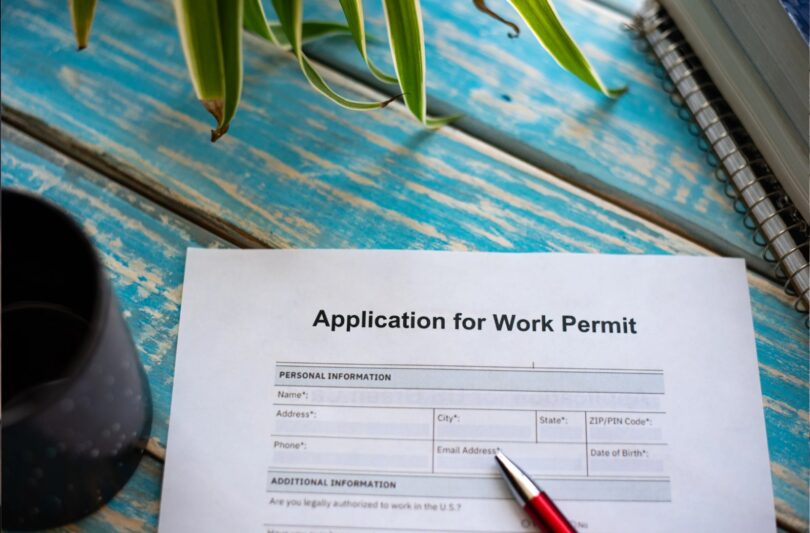Advertisements
Working in Canada under the Temporary Foreign Worker Program (TFWP) can be a rewarding experience. But what happens when your work permit’s expiry date is approaching, and you wish to continue your employment? Extending your work permit is possible, and in this article, we will take you through the entire process so you can get to understand how it works.
What is the Temporary Foreign Worker Program (TFWP)
The TFWP allows Canadian employers to hire foreign workers to fill temporary labor shortages. This occurs when eligible Canadians are not obtainable for the job positions. If you’re working in Canada under this program, your work permit is typically employer-specific, meaning it ties you to a particular job and employer.
To achieve this, the Canadian employer must obtain a positive Labor Market Impact Assessment (LMIA) to be able to employ foreigners under this program. This LMIA is a proof that no Canadian employee or permanent resident is qualified or able to do the job.
Why Might You Need to Extend Your Work Permit?
There are several reasons you might need to extend your work permit:
- Job Continuation: You will need to extend your work permit if your employer wants to keep you beyond your current permit’s expiry date.
- Job Changes: Also, if your role, duties, or wages have changed significantly, then you will be required to extend your work permit.
- New Employment: If you eventually get offered a position with a different employer, then you will be expected to extend your work permit.
Eligibility Criteria for Extending Your Work Permit
Before diving into the extension process, it is necessary you first ensure you meet the following criteria:
- Valid Status: You must be in Canada with a valid work permit.
- Employer Compliance: Your current or prospective employer must have met all necessary requirements, including obtaining a new Labour Market Impact Assessment (LMIA) if applicable.
- Job Continuity: Your current employer must wish to retain you beyond the expiration date of your current work permit.
- Application Timing: It’s recommended to apply at least 30 days before your current permit expires.
How to Extend Your Work Permit
-
Check Your Passport’s Validity
Ensure your passport is valid for the entire duration of the intended work permit extension. Immigration, Refugees and Citizenship Canada (IRCC) will not issue a work permit beyond the passport’s expiry date.
-
Determine If a New LMIA Is Required
Most employer-specific work permits under the TFWP require a positive or neutral LMIA. This document demonstrates that hiring you won’t negatively impact the Canadian labor market. Your employer is responsible for obtaining this assessment. In some cases, our employer will need to obtain a new LMIA if they want to retain you.
-
Gather Necessary Documents
Prepare the following documents to begin your application:
- Valid Passport: Make sure your passport will stay valid for the period of time of your requested work permit extension..
- Job Offer Letter: You will need to present a letter from your employer to show continued employment.
- LMIA Approval: A copy of the new LMIA, if required.
- Current Work Permit: You will also present a copy of your existing permit.
- Proof of Employment: You will need to show recent pay stubs or a letter from your employer to prove your employment status.
-
Submit Your Application
You will now need to submit your application online through the IRCC portal. Ensure all forms are filled out correctly, and all necessary documents are uploaded. The application fee is around CAD $155. Make sure you apply for your work permit extension 30 days before the expiration of the current one.
-
Maintain Your Status During Processing
If you apply before your current work permit expires, you can keep working under the same conditions while your application is processed. This is a process called “maintained status.”
Common Mistakes to Avoid
-
- LMIA Delays: Encourage your employer to apply for an LMIA early so as to avoid any form of employment interruptions.
- Applying Late: Always apply at least 30 days before your current permit expires.
- Incomplete Documentation: Ensure all required documents are submitted to avoid delays.
- Ignoring Passport Expiry: Your passport must be valid for the entire duration of the requested extension.
- Job Change: It is also important you know that some job changes may need you to get a new work permit instead of extending your current one.
Alternative Options to Extending Your Work Permit
If extending your work permit under the Temporary Foreign Worker Program (TFWP) is not an option or you’re looking for other ways to stay and work in Canada, there are several alternative routes you can explore and they are:
1. Transitioning to Permanent Residency
If you plan to live and work in Canada permanently, you may want to apply for permanent residency (PR). Some pathways under this program include:
- Express Entry System – A points-based system for skilled workers. If you have Canadian work experience, you may qualify under the Canadian Experience Class (CEC).
- Provincial Nominee Program (PNP) – Some provinces nominate foreign workers for PR based on their skills and job experience.
- Atlantic Immigration Program (AIP) – If you work in Atlantic Canada, you may qualify for PR under this program.
If you are able to obtain permanent residency, you’ll no longer need a work permit to work in Canada.
2. Open Work Permits
Unlike employer-specific work permits, open work permits allow you to work for any employer in Canada. This work permit grants you flexibility and gives you the opportunity to explore better job options without being tied down to one specific employer.
Advertisements
3. Applying for a New Job with LMIA Support
If your current employer is unable to extend your work permit, you can look for another job in Canada. However, most jobs under the TFWP require a Labour Market Impact Assessment (LMIA), which your new employer must apply for to prove that hiring you won’t negatively affect Canadian workers. Once you secure an LMIA-approved job offer, you can apply for a new employer-specific work permit.
4. Post-Graduation Work Permit (PGWP)
This work permit is for international students who studied in Canada at a designated learning institution (DLI). They may qualify for a Post-Graduation Work Permit which allows them to work for any employer in Canada for up to three years, depending on the length of their studies. The PGWP is a great option for international students who want to gain Canadian work experience before applying for PR.
5. Provincial and Regional Pilot Programs
Several provinces and regions in Canada run pilot programs to bring in foreign workers in specific industries. These programs often provide a pathway to work permits and permanent residency.
Some notable pilot programs include:
- Atlantic Immigration Program (AIP) – This program is suitable for skilled and intermediate-level workers in Atlantic Canada (Newfoundland & Labrador, PEI, Nova Scotia, and New Brunswick).
- Rural and Northern Immigration Pilot (RNIP) – This is a program for workers who want to live in small communities across Canada.
- Agri-Food Pilot – This is for agricultural workers in meat processing, greenhouse farming, and other food production sectors.
If your occupation falls under any of these programs, you may qualify for a work permit and later transition to PR.
6. Employer-Specific Work Permits
If you want to continue working in Canada but cannot extend your current permit under the TFWP, you can apply for a new employer-specific work permit. This permit ties you to one employer and job role, meaning you cannot work for another employer without applying for a new permit. This option is best if you already have an employer who is willing to support your work permit application.
Frequently Asked Questions (FAQs)
-
Can I continue working while my extension application is being processed?
Yes, if you applied before your current permit expired, you have “maintained status,” allowing you to work under the same conditions until a decision is made.
-
What happens if my work permit expires before I apply for an extension?
You must stop working immediately and apply to restore your status within 90 days. During this period, you cannot work until your status is restored.
-
Do I need a new LMIA for an extension?
Yes, in most cases, a new positive or neutral LMIA is required for an extension under the TFWP. Your employer must obtain this document.
-
How long does the extension process take?
Processing times vary. It’s advisable to check the current processing times on the IRCC website.
-
Can I change employers with my current work permit?
No, employer-specific work permits tie you to one employer. To change employers, you must apply for a new work permit.
-
What fees are associated with extending a work permit?
The standard processing fee is CAD $155. Additional fees may apply if biometrics are required.
-
Can I travel outside Canada while my extension is being processed?
You can, but re-entry isn’t guaranteed. It’s recommended to wait until your new permit is approved before traveling.
Conclusion
Extending your work permit under the Temporary Foreign Worker Program (TFWP) is an important step that you need to take if you wish to continue working in Canada. Make sure you understand the requirements and begin to apply early so you can improve your chances of staying and working legally in Canada.
However, if extending your permit isn’t possible, there are other options to explore. Canada offers multiple pathways for foreign workers to continue their careers and even build a long-term future in the country.
Canada remains a land of opportunity, and with the right approach, you can continue building your career in this diverse and welcoming country!
Advertisements






